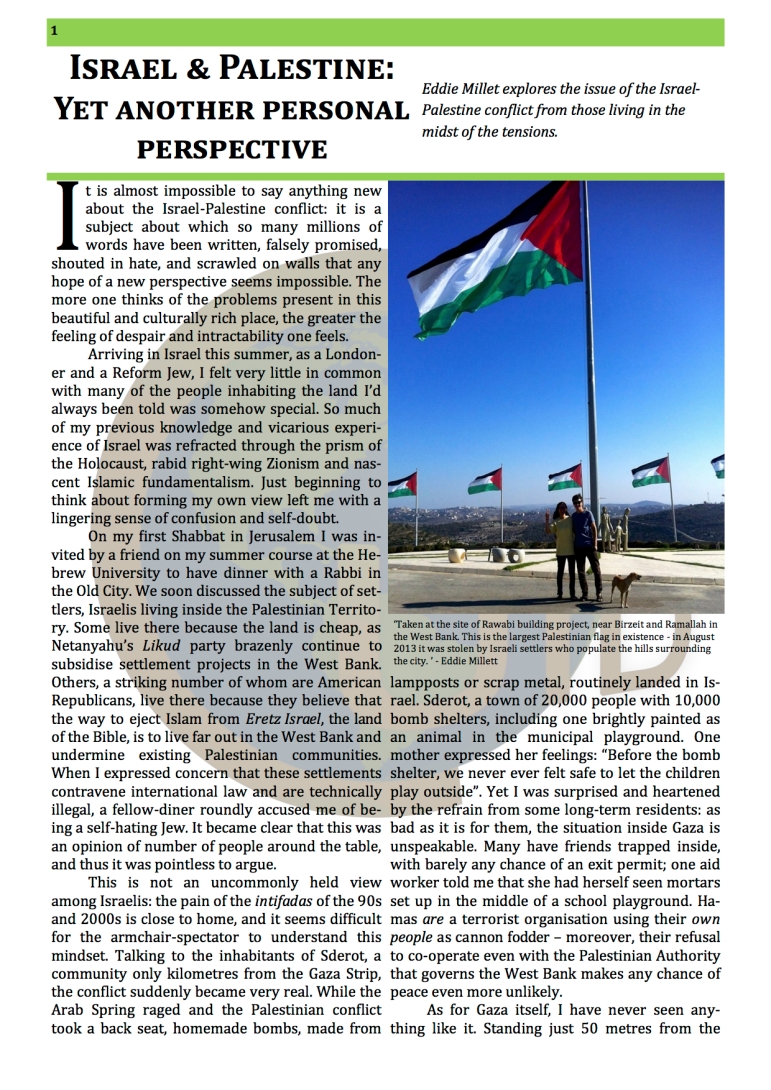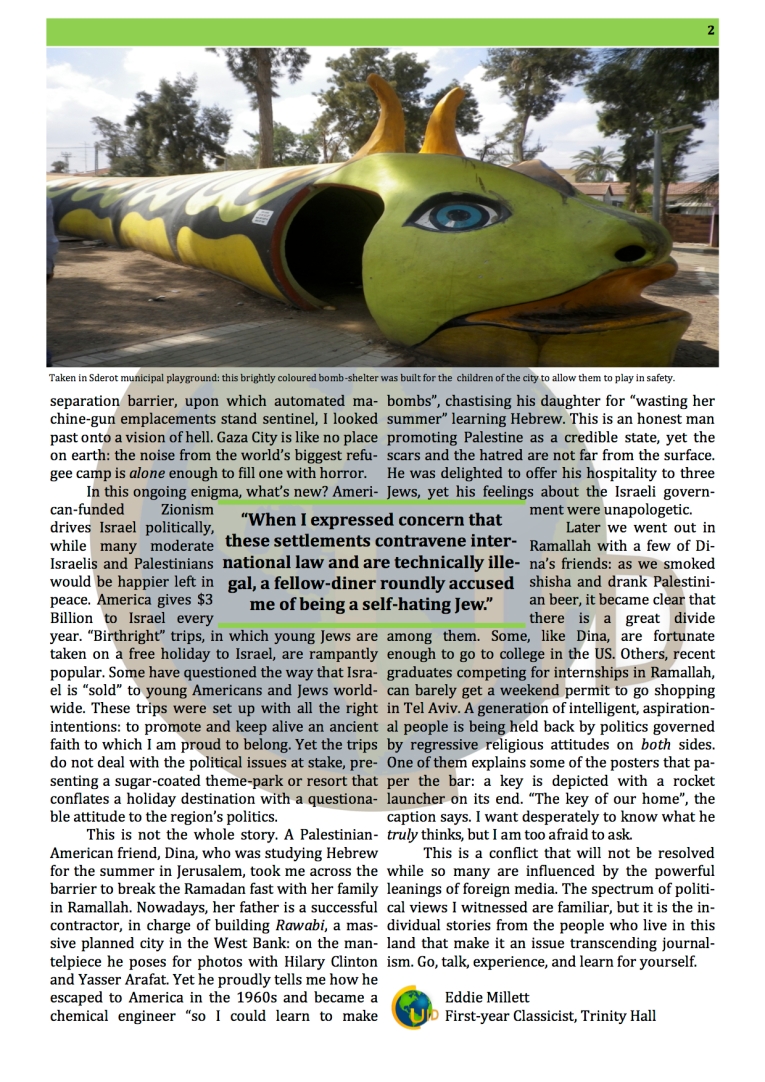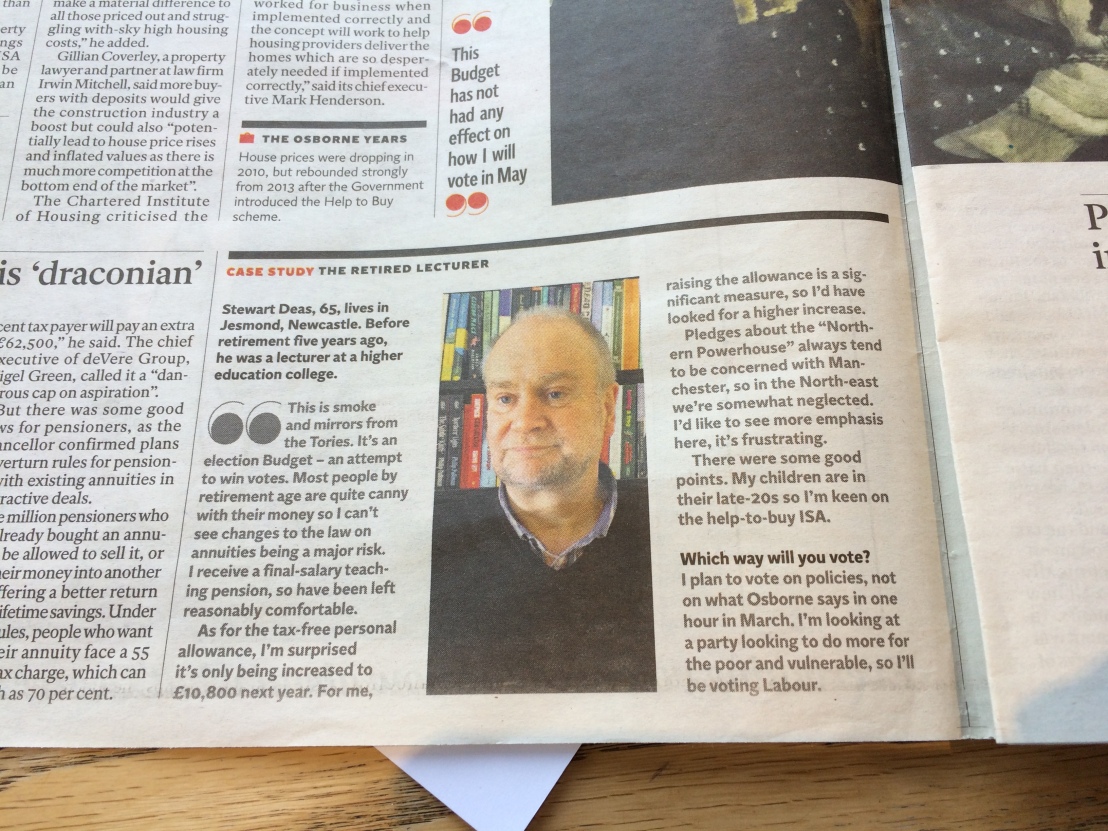 Case study collated for Spring Budget 2015, following interviews relating to proposed annuities changes.
Case study collated for Spring Budget 2015, following interviews relating to proposed annuities changes.
Archive Post: The Telegraph Kolkata


Archive post: front page of The Telegraph Kolkata
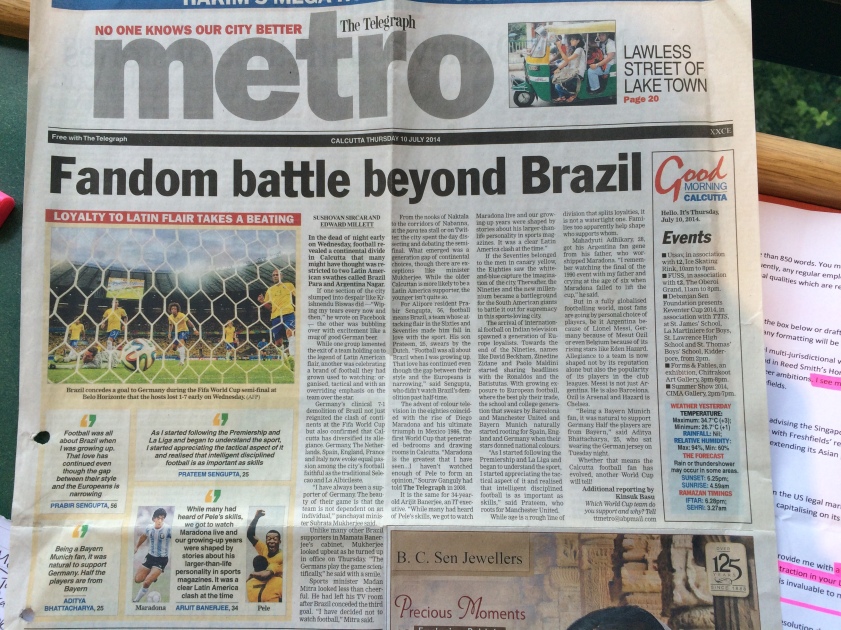
‘I have always depended on the kindness of strangers…’ Frustrated in Calais
The kindness of volunteers is no replacement for a robust aid policy to deal with the crisis unfolding in Britain’s back yard
Once again, our hopes for a white Christmas in the UK were to be disappointed this year. For the migrants living just miles from our shores in the camps at Calais and Dunkirk, however, December’s mild weather has been a real relief. Facing down the barrel of 2016, and with a long winter still ahead, the policy failings of British and French governments are being thrown into harsh relief. As long as the good will of a few hastily-constructed charitable organisations has to make up the shortfall, the suffering of migrants on the ground will persist.
To date, government policy on the situation has been woefully inconsistent, characterised by prevarication, fear-mongering, and emotional rhetoric. UK border-force officers have been visiting camps to provide a ‘more dissuasive and realistic sense of life for illegal migrants’ once in the UK, according to a Home Office spokesman. Meanwhile Bernard Cazeneuve, French Interior Minister, has said that asylum seekers will be welcomed ‘with dignity’ but illegal immigrants would not be tolerated.
Little is being done on the ground to alleviate matters. The stretch of Calais motorway under which the camp sprawls is crowded with riot vans, blue lights flashing on the hard shoulder. Placed here after multiple fatalities as migrants tried to cross the motorway on foot, they do little but unsettle the volunteers, like myself, travelling to the camp every day.
Reports from those living inside are little better. Every night, as migrants head for the lorry parks near the Channel Tunnel, clashes with police occur. One Kurdish migrant told stories of arbitrary tear-gassings on a weekly basis, as French gendarmes attempt to keep migrants on edge. Halogen lampposts have been rigged up down the ‘main street’ of the camp, ostensibly to aid the migrants, but also to make policing the camp easier.
In the absence of a robust government policy, volunteers are filling the gap. L’Auberge des Migrants, a self-funded charity set up in 2015, operates out of a warehouse near the camp, where they process the ever-growing mound of unsorted aid, build prefabricated shelters, and undertake daily deliveries and repairs inside the camp. Faced with a gargantuan organisational task, not to mention an ever-changing array of eager-but-clueless churchgoers and student weekenders like myself, they too are falling woefully short.
While the operation at the aid depot is run with a degree of organisation, distribution trips into the camp itself often run into planning troubles. Presented with an armful of mismatched tent parts and tarpaulins, I was instructed to go and repair dwellings that had collapsed during a particularly stormy night. Cue a long and frustrating afternoon of miming and broken English in which a pitiful number of tents were repaired. Nearby, a poorly-organised distribution of fresh fruit led to crates of melons being soiled in the mud, and a fire needed extinguishing, started by an open flame burning just inches from tent canvas. Across the camp, hygiene levels and fire safety are a serious concern, with volunteers expressing concerns that the next disease outbreak can only be imminent.
Only recently have local authorities begun acting in support of L’Auberge, with the mayor of Calais establishing a permit system to reorganise aid distribution efforts, preventing weekend warriors and gawkers rocking up and doing more harm than good. Yet this is a far cry from refugee facilities in disaster-zones like Turkey or Sudan.
But as long as refugees have to rely on the sometimes-misplaced goodwill of volunteers, their sufferings will only worsen throughout this winter.
Welcome to Checkpoint Cambridge: my interview with the Israeli ambassador to the UK
[This article can be found published in full at The Cambridge Student website]
Security was bound to be tight in the run-up to Israeli ambassador Daniel Taub’s speech at the Union, but the first I knew of it was when I got busted by local police for cycling the wrong way down Trinity Street. Arriving at the Union, to be met by barricades, protesters, and a scrutinising pat-down by ex-Mossad heavies, it became dramatically clear that this was to be no run-of-the-mill interview.
After being relieved of all my possessions, even down to my biro (‘it’s a potential weapon’, I was gruffly told), I was shown into the Union’s red room to await Taub’s arrival. ‘You’ll get two questions, maybe three if you’re lucky’, one of the slightly jittery press officers informed me.

Upstairs in the Union’s library, Taub was talking exclusively with members of Cambridge’s Jewish Society, about the future of Israel and their place within it, so I took the chance to chat to Tim Squirrel, the Cambridge Union Society’s President.
On the subject of the Palestinian Society protests happening outside, Squirrel was even-handed: ‘we did in fact invite a number of Palestinian notaries along, but they declined’. He remained philosophical about one recent complaint levelled at the Union, that speakers ‘offer their propaganda, then piss off in a blacked-out car’, stating his feeling that ‘we do need to increase the amount of interaction between students and speakers’ over and above the current level.
Even he hadn’t escaped the brusque efficiency of Israeli security methods, funded in part by the Union itself, with the Union angling for a security contribution from JSoc in return for their use of the Library: ‘I got barred from entering earlier, and it took a lot of persuading to get them to let me in!’

Taub, when he finally arrived mobbed by Israeli security heavies, was careful to point out that he would have openly welcomed the chance to address PalSoc. ‘My aim in coming is to make people as knowledgeable as possible, and to speak to as many groups as possible. I want to inform people.’
I put to Taub the sentiment expressed to me only recently by John Lyndon, Chief Operating Officer of the grassroots Israeli-Palestinian political organisation OneVoice: ‘nobody’s harder to dialogue with about the conflict than a British male undergraduate’. Taub, however, seems up to the challenge. ‘I relish the electric atmosphere of places like Cambridge. It takes commitment to create intellectual spaces like the Union for dialogue’, and on many campuses ‘the challenge is one of actually creating the space in the first place.’ Unsurprisingly, then, PalSoc’s protest outside was not well-received: ‘such tactics of intimidation limit the ability of those intellectual spaces to function’.
Ever the consummate diplomat – described by another journalist as ‘very slick’ – Taub was able to block and parry my more pointed questioning. I asked him about events that took place this week in the Silwan neighbourhood of East Jerusalem, in which nine Jewish Israeli families arrived in the dead of night to take over two empty buildings. Operating under the auspices of the aggressive settler organisation Ateret Cohanim, their action is part of a wider attempt to dilute the Palestinian identity of East Jerusalem.
If settling Jews beyond the ‘Green Line’ in Palestinian East Jerusalem is legitimate, I ask him why organisations are sneaking in settlers in the middle of the night. On this question Taub prevaricated, highlighting that Arabs are ‘perfectly entitled’ to move into Jewish areas, stating that he didn’t have all the evidence for what had gone on in Silwan recently.
As talk turns to the subject of this summer’s conflict, Taub emphasises the role of the media. ‘There is a special responsibility on the media’ to expose ‘where and why there is suffering’.
Before Taub was whisked away, I had time to nudge him once more. ‘What are your thoughts on the Hummus solution?’ I asked, referring to the satirical third alternative for the region to the proposed one-state and two-state solutions, by which everyone gets so much free hummus they all stop fighting and go home.He gives a genuine grin at that, and makes a sharp quip about collective indigestion issues.

Then he’s off – one of his heavies steps in and cuts us off, and we are spirited away. Taub, like Netanyahu, is a consummate diplomat: always prepared with an answer to the most pointed of questions, able to block and parry with effective evidence, or, failing that, cast doubt on assertions.
As a new poll by the Jerusalem Center for Public Affairs, released this week, reveals that 74% of Jewish Israelis oppose the establishment of a Palestinian state along the pre-1967 borders, we are at a crucial crossroads in the narrative of the State of Israel. The intense professionalism of Israel’s diplomatic service, while a credit to it, is also a visible demonstration of the manner in which Israel has continued to skirt around difficult issues all summer. Indeed the last-minute total live media blackout at the Union last night, as the regular livestream was cancelled, is a gag on media freedom that is worryingly indicative.
One last comment of Taub’s struck me in particular though, as he stated that the most useful thing he could bring to the Union was not more rehashed Israeli spin, but his genuine ‘experience of the negotiating room’. The individual narratives that make up this conflict are poorly represented by media buzzwords such as ‘left-wing’ or ‘right-wing’, ‘2-stater’ or ‘settler’: talk to Israeli anti-fascists violently assaulted on the streets of Tel Aviv, long-established Negev dwellers sick of Qassam rockets, or bright graduates of Birzeit University in Ramallah desperate for an internship and an European inter-rail ticket, and the picture starts to become a lot more complex than the TV news ticker would make it out.
Sock it to me, hipsters.
Published on the website of The Cambridge Student here :
Attempting to apply logic to the dizzy highs and criminal lows of fashion has always been a bit of a mug’s game. Bacon as evening wear? You’d have to be Gaga. Dungarees? Is it time for arts and crafts class? Are you panning for gold? No? Go right ahead, Topshop ruminant. So far, so niche. How about something as ordinary as the white sock, then?
Well, if you’re the kind of person who whiled away the dying rasps of summertime having the time of your life on the Isle of Wight, or at Carnival in Notting Hill, or just skulking in Brixton and Aldgate (with sincere apologies for my inexcusable cultural ignorance of anywhere outside Zone 2), you’re pretty likely to have seen someone sporting what seems to be the latest on-trend look: rolled black jeans, black Kicker trainers, and crucially, a pristine pair of white Nike sports socks peeking out from between the two, drawing the whole ensemble together.
What’s going on here? Has everyone run out of dress socks? Or are they all undercover superheroes, pre-socked and prepared to fight crime in the streets of Camberwell? When M&S’s Back to School range are flogging black socks at £4 for 5, I find it a little hard to believe. Perhaps they’re all too busy discussing Hayek’s Road to Serfdom and the latest from ‘Netanyahu: Live at the UN’ to bother caring what colour the cotton barrier between their shoe and their feet is? But if so, why always white?
Of course, it’s much cleverer than that. It’s a carefully constructed critique of societal norms, a stark monochromatic transgression that threatens the very fabric of fashion. Look at my f**king red trousers done by lefties, you might say.
This isn’t the only way that the simple sock is making its presence felt, though. In May,The Telegraph, that well-known arbiter of style, bemoaned the advent of “dark sartorial times” with the rise to prominence of another transgressive look: socks and sandals. Long-derided as the identifier of German tourists and vegan social workers, it has now been appropriated by hipsters hosting ‘socks ‘n slides’ parties in the lofts of East London to celebrate the unlikely pairing of pool slippers with sport socks. There are even Facebook groups dedicated to the trend.
And typically, big business is there to pick up the profits, with Debenhams reporting a 68% rise in the sale of socks and sandals – although there’s no way of knowing who’s pairing the two and who’s tucking them into their Kickers.
So there you have it. Winter is coming, and when all that’s left in your sock drawer is a glistening pair of white ones, gloatingly reminding you of all that running you were planning to do after Fresher’s Week, you can stride out, inappropriately socked, safe in the knowledge that the fashion cosmos is imploding about you. Long live double denim, brown shoes after 6pm, and socks and sandals!

Late summer in Turkey, Georgia and Armenia.
[There is a slightly shortened version of this article currently residing at tcs.cam.ac.uk, but you don’t get to read about sexy times on the train to Armenia in that one.]

Back in March, when exams still loomed small on the horizon, I set about deciding on the destination for my Big Summer Trip. Having subscribed to the philosophy that now that I am young, stupid, and have at my disposal a generous overdraft, I should go and see the world, I seem to have picked up the strange habit of buying indirect flights at disgusting hours to difficult places, and then getting in the back of random people’s cars. When I have holidays that are less insanely lengthy, more money, and (crucially) a job, I will jump on the boozy apartment-in-the-Med holiday bandwagon, where I can play Scrabble, read novels and drink cocktails that are four/fifths gin.

So for the moment, the Big Summer Trip, and any accusations of being a pretentious arse with a hunkering for another gap year are here to stay. But I won’t pretend that I didn’t feel a little tiny bit of superiority when telling an acquaintance recently: “the South of France? Lovely. Actually I’ve just got back from Yerevan myself.” But so it goes.
The notion of going to the Caucasus region stemmed from a long-harboured desire to travel the Silk Road, overland, from Istanbul to Xi’an in the manner of the Marco Polo (and with only a spare pair of pants, if possible). However, the boring minutiae of life (read: actually having to go back to Uni at some point), as well as complex bureaucratic hiccups (Uzbek Letters of Invitation, £120 Azeri visas, and the arbitrary bit of ink in Hebrew script that means that I am currently an Enemy of the Islamic Republic of Iran) meant that I settled on Turkey and the Caucasus as my mission for this summer.

So I, along with an essential Russian-speaker (and a rather less-useful Hindi-speaker) started our Journey to the Eastern Star in Istanbul (because every Big Trip needs a couple of Theroux-esque dramatic nicknames). Though judging from the number of Warm Vintage snaps my multilingual companion took of the Blue Mosque, it might better be renamed Insta-bul.
It’s a city that defies description without inevitable cliché, so I’m not going to bother (so far, so gonzo). East meets West. Heartland of Ottoman culture. Breathtaking architecture. Etcetera. I’m convinced that my poxy insights into one of the great world capitals aren’t actually that useful, so I’ll limit myself to a couple of observations.

Crucially, I was struck by the astonishing grumpiness of Istanbullus (for such are they called, according to my battered copy of Rough Guide Istanbul 2008). Everywhere east of Istanbul, I found the Turks to be warm, welcoming people (unless you’re Armenian), and while I met some lovely locals, including the ice-cool, heavily bearded surf dude Mustafa running our guesthouse in Beyoglu, or the jolly guys selling delicious rice-stuffed mussels on the docks, we also came up against some stunningly short levels of shrift. The slipper-salesman in the Grand Bazaar who flat out refused to haggle even by a Lira, before telling me that ‘If you only want to look, go to a museum’. The ticket saleswoman at Sirkeci train station who listened carefully to our pleas for a ticket to Ankara, before barking ‘Not Possible’ and slamming the window shut.

Eventually, we managed to locate some tickets and headed East on a slightly ill-advised overland trip to Tbilisi that would mean 3 days without a bed. Predictably, the journey was one of the best parts of the trip, populated with memorable individuals of various shades. The kids sharing our compartment on the Ankara-Kars Ekspres who thought that Snapchat was the best thing since to arrive in Turkey since Ataturk. The opinionated politics students knocking back Efes beer in the train dining car at 10am (“Iran: bad. Israel: very bad. Russia, Azerbaijan: Great. And Armenia? Get out”). The restauranteur in Erzurum who sustained us with drool-worthy mutton kebabs and gave directions for the next leg of the journey in crisp High German (cue my annoyingly multi-lingual mate Sacha: “oh, I only studied German for a year or two when I was 9”).
Even getting stranded at the Turkey-Georgian border was a unique moment. After waking up the coach operator and demanding a seat, we consigned ourselves to a long wait drinking sugary black chai and watching truckers, laden with aid (or possibly drugs and guns, who knows?) on their way to Syria, Donetsk, or Kurdestan, arrive at our teashop, kiss the owner on both cheeks, and troop upstairs for an hour or two of de-stress with one of the sex workers on shift.
Waking up as we thundered through the middle of the Georgian countryside was a breathtaking moment, even if my companion couldn’t stop mooning after the Georgian ticket collector, while I insisted on trying my (shoddy) Arabic on some poor guy who I had somehow convinced myself was Lebanese. The country is a unique place that manages to maintain its singular Georgian cultural and linguistic identity while being democratic (they fired thirty thousand police in 2005 to fight corruption: thirty thousand), friendly, and judging by the number of EU flags in Tbilisi, strongly pro-Europe.
Tbilisi is a lovely old town that looks how Budapest would if it hadn’t been done up. Tumbledown pastel-coloured Art Nouveau mansions and lavish boulevards, including Freedom Square with its shiny gold column of St George and the Dragon. Dark, barrel-vaulted restaurants below street level where you can neck cognac and eat enormous sausages for a few quid. All looked down upon by the beautiful Narikala fortress, with its terrifyingly Soviet looking ‘Mother Georgia’ statue.

Outside Tbilisi, Georgia is full of stunning landscapes, even before you head North towards the Great Caucasus. At Jvari, the setting of Lermontov’s Romantic poem Mtsyri, we watched the sun set over the confluence of two rivers wending through the Caucausian foothills, while a somewhat unexpected Punjabi man tried to flog us fur hats. At this point my friend got extremely excited, and learnt that there is in fact a small community of Punjabis living in the country, making a fast buck off the growing tourist industry (they all live in a small community that I decided could be called Punjabaijan, or something else equally un-PC).
Buying a night train ticket to Yerevan proved to a great deal easier than our nightmare in Istanbul, and the train itself was a bizarre time-warp to the USSR, circa 1978. Our couchette was dripping with lamé gold curtains, there was little to buy except hard liquor, and the portly Armenian border guard in an officious (and itchy-looking) uniform was, at the border crossing at 3am, nowhere to be found. After some time, we decided to go looking for him, in order to validate our passports, allow us entry to Armenia, and let us go back to sleep. Stumbling into a seemingly empty carriage, he was to be found feeling up one of the long-legged female ticket inspectors. Caught red handed, he stamped our passports grumpily and sloped off for a cigarette.

Yerevan itself is a somewhat perfunctory Soviet-looking city, yet its people more than make up for it. Proud, dark-featured and striking, they are some of the loveliest people I came across on the trip. The student running our guesthouse was so excited to meet English students that she gave us the best room in the place, while the kids fooling about outside Echmiazin church (the Holy See of the Armenian Apostolic Church, no less) insisted on dragging us off to play football until it was dark – which meant hitching a mildly terrifying lift with a couple of Racer Boys back to Yerevan, who manfully showed us how fast they could gun the engine on their poor Nissan. Upon being asked: “You are English? Do you like Tottenham Hotspur?” I entered a state of mild shock, unable to believe that my middle-of-the-road London club had made it this far East.
Travelling west of Yerevan to the church of Khor Virap, perched under looming Mt Ararat right on the Turkish border, was a deeply affecting moment. The Armenian genocide, in which the Turks murdered 1.5 million Armenians and took away half of their land (according to pretty much everyone, except Turkey), truly stares you in the face as you look down from the typically Armenian church, across the river that forms the permanently closed frontier and up to Ararat, just inside Turkey and an enduring icon of Armenia’s ancient culture and turbulent history. As you stand beside Christian devotees, looking at the mountain that is a living reminder of appalling events nearly a century ago, the sound of the muezzin’s song drifts up from the mosque in the valley, as if to drive home the point. Call me a cynic, but I was sure that those loudspeakers were directed at the church.

Currently, the tourist demographic heading out to the Caucasus is largely made up of Poles and Russians keen for a cheap hiking holiday (the news on Donetsk from one half-Ukrainian, half-Russian? “It’s pretty much business as usual in Moscow, although my family in Kiev are refusing to talk to me”), Armenians of the diaspora looking to reconnect with their roots, crazy Americans on a round-the-world cycling odyssey: and no fewer than 5 other Oxbridge students who’d had the same idea as us. Typical. Still, I absolutely loved the Caucasus, so here’s to Big Summer Trip 2015 (in which we visit the break-away territory of Nagorno-Karabakh and then hitchhike to Tehran. Maybe).
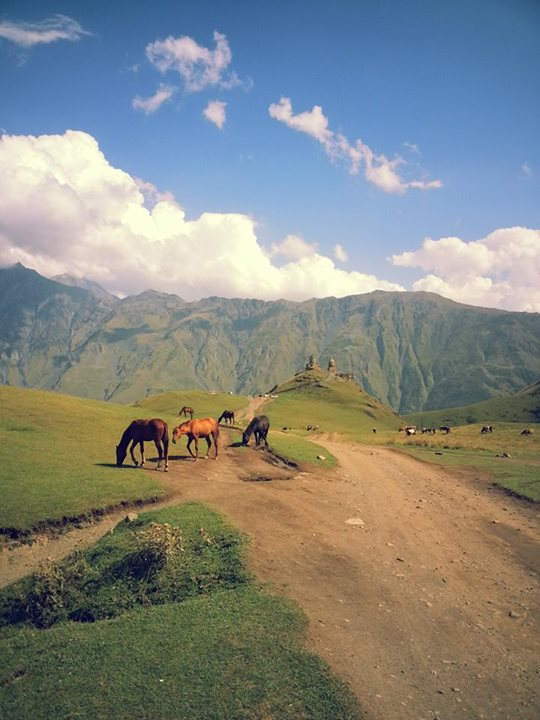
[With thanks to Sacha Mehta for the photos. Mine were all rubbish.]
An inevitable post on Israel.
Hello.
I’ve actually had this blog for a while, but never bothered to tell anyone of its existence. Not even my mother, who, along with a couple of grannies driving Nissan Micras home to the Fenland bungalows of Cambridgeshire, dutifully listens to my ramblings on the radio.
A good enough example of why this blog never saw the light of day is, in fact, my previous attempt at a welcoming article:
“This is the first time I’ve had my own blog. In fact, I’ve harboured a desire to have one for a while. I gave tumblr a go but found it baffling, slightly pretentious and cliched: essentially all pictures of women’s bottoms, weed-smoking paraphernalia, and lovely views of infinity pools. This isn’t really FOR anyone’s benefit, enjoyment or interest. It’s a way of giving my creative juices an outlet in word form. In some ways, a diary, then.”
Why online, especially if nobody is there to read it? If I were to strt it in a private word document (hand writing is far too slow) it would lack the frisson, the hard-edged reality of the invisible, possible audience out there. Like dogging, you might say.”
Enough of that, please.
I will be posting occasional pieces of creative energy up here, so please feel free to read, comment, praise, openly mock, as you please.





